25 nov 2019
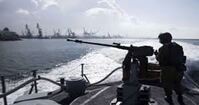
A Palestinian fisherman was injured on Monday evening when Israeli naval forces opened fire at Palestinian fishing boats in Gaza waters.
The Palestinian Fishermen of Gaza Committee said that a fisherman suffered a rubber bullet injury when Israeli gunboats attacked a group of Palestinian fishermen off Gaza shore.
According to human rights groups, the Israeli occupation navy has committed over 310 violations against Palestinian fishermen in the Gaza Strip since the beginning of 2019.
At least, 17 fishermen were wounded in shooting attacks, 35 fishermen were arrested, and 15 fishing boats were seized.
The Palestinian Fishermen of Gaza Committee said that a fisherman suffered a rubber bullet injury when Israeli gunboats attacked a group of Palestinian fishermen off Gaza shore.
According to human rights groups, the Israeli occupation navy has committed over 310 violations against Palestinian fishermen in the Gaza Strip since the beginning of 2019.
At least, 17 fishermen were wounded in shooting attacks, 35 fishermen were arrested, and 15 fishing boats were seized.
24 nov 2019
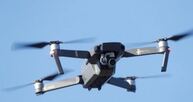
The Israeli occupation forces (IOF) on Saturday evening shot down a small drone as it was flying near the border fence in the southern Gaza Strip.
According to Israeli news reports, the drone, which was not carrying any explosives or dangerous materials, was taken in for review after its remains were found on the Israeli side of the border.
Last month, the army shot down two drones in Gaza in separate incidents.
The incident followed a quiet weekend along the Gaza border, where for the second week running Friday protest marches were called off.
According to Israeli news reports, the drone, which was not carrying any explosives or dangerous materials, was taken in for review after its remains were found on the Israeli side of the border.
Last month, the army shot down two drones in Gaza in separate incidents.
The incident followed a quiet weekend along the Gaza border, where for the second week running Friday protest marches were called off.
23 nov 2019
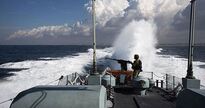
Israeli naval forces on Saturday morning opened fire at Palestinian fishing boats off the coast of northern Gaza with no injuries reported.
The Palestinian Fishermen of Gaza Committee said that Israeli gunboats heavily opened fire at Palestinian fishermen sailing in Gaza waters in the early morning hours.
The committee said that the fishermen were attacked while fishing within the permitted area, which is three nautical miles.
Israeli occupation authorities on Thursday, 14 November, allowed Gaza fishermen to sail in Gaza waters following a two-day closure that accompanied a military aggression on the besieged territory.
On Tuesday, 12 November, the Israeli occupation army launched a military assault on the Gaza Strip that lasted for two days and killed 34 Palestinians, including three children, and injured 111.
The Palestinian Fishermen of Gaza Committee said that Israeli gunboats heavily opened fire at Palestinian fishermen sailing in Gaza waters in the early morning hours.
The committee said that the fishermen were attacked while fishing within the permitted area, which is three nautical miles.
Israeli occupation authorities on Thursday, 14 November, allowed Gaza fishermen to sail in Gaza waters following a two-day closure that accompanied a military aggression on the besieged territory.
On Tuesday, 12 November, the Israeli occupation army launched a military assault on the Gaza Strip that lasted for two days and killed 34 Palestinians, including three children, and injured 111.
22 nov 2019
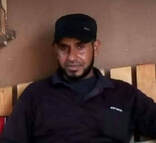
Mohammad Salama Sawarka, 40
A Palestinian man died on Friday from injuries he sustained when the Israeli occupation army bombed two homes for Al-Sawarka family in the Gaza Strip last week, raising the number of fatalities in the massacre to 9.
The Ministry of Health said that Mohammed Al-Sawarka, 40, succumbed to his wounds in a Gaza hospital in the afternoon.
At daybreak Friday, 14 November, Israeli warplanes fired four missiles at two Palestinian homes inhabited by Mohammed Al-Sawarka, 40, his brother Rasmi Al-Sawarka, 45, and their families in Deir al-Balah, central Gaza Strip.
Rasmi Al-Sawarka, his wife and three of their children were instantly killed in the attack along with Mohammed Al-Sawarka's wife and two of their children. Mohammed was transferred to the hospital while in critical condition.
Last week, the Israeli occupation army waged a three-day military aggression on the Gaza Strip, killing 35 Palestinians and injuring 111.
A Palestinian man died on Friday from injuries he sustained when the Israeli occupation army bombed two homes for Al-Sawarka family in the Gaza Strip last week, raising the number of fatalities in the massacre to 9.
The Ministry of Health said that Mohammed Al-Sawarka, 40, succumbed to his wounds in a Gaza hospital in the afternoon.
At daybreak Friday, 14 November, Israeli warplanes fired four missiles at two Palestinian homes inhabited by Mohammed Al-Sawarka, 40, his brother Rasmi Al-Sawarka, 45, and their families in Deir al-Balah, central Gaza Strip.
Rasmi Al-Sawarka, his wife and three of their children were instantly killed in the attack along with Mohammed Al-Sawarka's wife and two of their children. Mohammed was transferred to the hospital while in critical condition.
Last week, the Israeli occupation army waged a three-day military aggression on the Gaza Strip, killing 35 Palestinians and injuring 111.
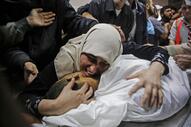
A mother mourns over her slain son at a hospital in Beit Lahia, Gaza, on 12 November
by Orly Noy
Every drop of blood spilled is the responsibility of those who perpetuate the occupation - and those whose silence enables the status quo
Once quiet was restored to Israel’s cities after the deadly, targeted attack in Gaza earlier this month and the missiles launched in response, Israel’s citizens quickly reverted to a normal routine.
Politicians and the media resumed their nauseatingly familiar normalcy: wallowing in the eternal political swamp, the impossibility of forming the next government and incitement against the country’s Palestinian citizens. Gaza, as usual, will now disappear from the public consciousness in Israel until the next missile is launched.
In the much-battered Gaza Strip, life also reverted to routine: having buried the victims of the latest massacre, among them women and children, Palestinians may now find the time to remove the new rubble, amid ever-deepening poverty, while awaiting the next massacre. And it will come - we know that it will. The mass killing of Palestinians in Gaza has increasingly become normalised.
Humiliated and dispossessed
But assuming that this fate is not inevitable, and that the Palestinian people were not created to be oppressed, humiliated, dispossessed and murdered by Israel, how can Palestinians resist this oppression, which has been ongoing for decades? Can anything be done to prevent the next mass murder of Palestinians?
You may say that negotiations could be conducted in an effort to bring an end to “the conflict”. Presumably, you would burst into bitter laughter before even finishing the sentence. Are Palestinians expected to rely on fair mediation by the White House, whose leader fully endorses all the injustices heaped by Israel upon the occupied territories?
Are they expected to rely on Israel’s good intentions, when a much more moderate prime minister than Israel’s present one sold them the Oslo lie, and then doubled the number of Israeli settlements in the West Bank, while simultaneously leading negotiations - and who was, on account of the latter, subsequently assassinated?
Or, you may say they could engage in popular protests. Do you mean the kind during which photojournalist Muad Amarna was shot and lost an eye because he was documenting a demonstration by residents of Surif, near Hebron, against the settler takeover of their village lands?
Or the weekly demonstrations in the Sheikh Jarrah neighbourhood of occupied East Jerusalem, during which demonstrators have been beaten and arrested for raising the Palestinian flag - an act that isn’t even legally proscribed in Israel, despite all its racist laws?
International complicity
You may say, what about mass demonstrations? By that, do you mean protests such as the Great March of Return, which despair-ridden residents of Gaza have been holding for more than a year and a half now, every Friday, facing the Gaza-Israel fence?
Those demonstrations have already cost the lives of hundreds of participants and injured many more, as people protest against the life of suffering that Israel has decreed will be theirs inside the besieged Gaza Strip.
Or you may suggest appealing to the international community! Do you mean the international community that, in the best-case scenario, watches with utter indifference the slow death of the Palestinian people - or, more routinely, cooperates actively in that process by arming and funding Israel, and vetoing even the most symbolic gesture against the injustice thus caused?
This is the same international community whose most outstanding act against Palestinian dispossession was to thwart - temporarily, at this point - the expulsion of the residents of Khan al-Ahmar, while turning a blind eye to the accelerating ethnic cleansing being conducted by Israel in the Jordan Valley.
Or maybe you would say that Palestinians could conduct a nonviolent struggle, by bringing economic pressure to bear on Israel to end the occupation. Do you mean the campaign of boycott, divestment and sanctions (BDS) that Israel has managed to brand as antisemitic - a branding so successful that even liberal circles condemn the work of its activists as illegitimate?
Power imbalance
The only legitimate answer to the question of how Palestinians should struggle against the oppression of their people is: in any way they deem appropriate.
The world has stood by and watched for more than half a century, doing virtually nothing to stop Israel from crushing the Palestinian people. The world has lost the moral right to criticise the methods of struggle chosen by Palestinians.
When Israeli citizens choose - over and over again, through their duly elected political leadership - to intensify the oppression, they lose the moral right to tell Palestinians how to conduct their struggle for liberation.
When the power relations between the two sides are so radically asymmetrical as to allow Israel to do whatever it pleases with Palestinian land, Palestinian property and Palestinian bodies, ordinary moral judgment loses its meaning.
When Israel consistently uses all possible means to thwart nonviolent resistance; when fully armed Israeli forces deem a Palestinian child clutching a pair of scissors to be a “terrorist” meriting execution; when even the most symbolic act of Palestinian resistance, such as the launching of burning kites from a besieged and dying Gaza across the wall towards Israeli territory, is termed a terrorist act posing an existential threat to Israel; when Palestinians’ determination to endure on their own land is repeatedly crushed by ethnic cleansing and expulsions, then the morality in whose name the world preaches to Palestinians loses all meaning.
Proportionality gap
In the decade between January 2009 and the end of October 2019, Israeli forces killed more than 3,400 Palestinians in the West Bank and Gaza, not including the victims of the most recent Gaza massacre.
There is no morality anywhere that would require Palestinians to simply sit with their hands folded as this horrifying destruction of their people approaches completion.
Those who wish to impose normative moral principles in a reality where nothing is normal should strive to provide Palestinians with the same military means that Israel has - and then, with army standing against army, each with symmetrical technological and intelligence capabilities, we could demand that the two sides be judged by the same moral yardstick.
Then, perhaps, Palestinians could respond with “reasonable proportionality” after the assassination of an armed man and his wife, via a parallel assassination of an Israeli military leader and his wife, instead of launching missiles aimed at Israeli communities (which, fortunately, wounded no one).
Even better, they could act to end the illegal and lethally violent occupation imposed on Palestinians for decades - before the next massacre in Gaza. But meanwhile, every drop of blood spilled, on both sides of the barricade, is the responsibility of the people who perpetuate the occupation, and the people whose contemptible silence enables them to do so.
Orly Noy
Orly Noy is a journalist and a political activist based in Jerusalem.
by Orly Noy
Every drop of blood spilled is the responsibility of those who perpetuate the occupation - and those whose silence enables the status quo
Once quiet was restored to Israel’s cities after the deadly, targeted attack in Gaza earlier this month and the missiles launched in response, Israel’s citizens quickly reverted to a normal routine.
Politicians and the media resumed their nauseatingly familiar normalcy: wallowing in the eternal political swamp, the impossibility of forming the next government and incitement against the country’s Palestinian citizens. Gaza, as usual, will now disappear from the public consciousness in Israel until the next missile is launched.
In the much-battered Gaza Strip, life also reverted to routine: having buried the victims of the latest massacre, among them women and children, Palestinians may now find the time to remove the new rubble, amid ever-deepening poverty, while awaiting the next massacre. And it will come - we know that it will. The mass killing of Palestinians in Gaza has increasingly become normalised.
Humiliated and dispossessed
But assuming that this fate is not inevitable, and that the Palestinian people were not created to be oppressed, humiliated, dispossessed and murdered by Israel, how can Palestinians resist this oppression, which has been ongoing for decades? Can anything be done to prevent the next mass murder of Palestinians?
You may say that negotiations could be conducted in an effort to bring an end to “the conflict”. Presumably, you would burst into bitter laughter before even finishing the sentence. Are Palestinians expected to rely on fair mediation by the White House, whose leader fully endorses all the injustices heaped by Israel upon the occupied territories?
Are they expected to rely on Israel’s good intentions, when a much more moderate prime minister than Israel’s present one sold them the Oslo lie, and then doubled the number of Israeli settlements in the West Bank, while simultaneously leading negotiations - and who was, on account of the latter, subsequently assassinated?
Or, you may say they could engage in popular protests. Do you mean the kind during which photojournalist Muad Amarna was shot and lost an eye because he was documenting a demonstration by residents of Surif, near Hebron, against the settler takeover of their village lands?
Or the weekly demonstrations in the Sheikh Jarrah neighbourhood of occupied East Jerusalem, during which demonstrators have been beaten and arrested for raising the Palestinian flag - an act that isn’t even legally proscribed in Israel, despite all its racist laws?
International complicity
You may say, what about mass demonstrations? By that, do you mean protests such as the Great March of Return, which despair-ridden residents of Gaza have been holding for more than a year and a half now, every Friday, facing the Gaza-Israel fence?
Those demonstrations have already cost the lives of hundreds of participants and injured many more, as people protest against the life of suffering that Israel has decreed will be theirs inside the besieged Gaza Strip.
Or you may suggest appealing to the international community! Do you mean the international community that, in the best-case scenario, watches with utter indifference the slow death of the Palestinian people - or, more routinely, cooperates actively in that process by arming and funding Israel, and vetoing even the most symbolic gesture against the injustice thus caused?
This is the same international community whose most outstanding act against Palestinian dispossession was to thwart - temporarily, at this point - the expulsion of the residents of Khan al-Ahmar, while turning a blind eye to the accelerating ethnic cleansing being conducted by Israel in the Jordan Valley.
Or maybe you would say that Palestinians could conduct a nonviolent struggle, by bringing economic pressure to bear on Israel to end the occupation. Do you mean the campaign of boycott, divestment and sanctions (BDS) that Israel has managed to brand as antisemitic - a branding so successful that even liberal circles condemn the work of its activists as illegitimate?
Power imbalance
The only legitimate answer to the question of how Palestinians should struggle against the oppression of their people is: in any way they deem appropriate.
The world has stood by and watched for more than half a century, doing virtually nothing to stop Israel from crushing the Palestinian people. The world has lost the moral right to criticise the methods of struggle chosen by Palestinians.
When Israeli citizens choose - over and over again, through their duly elected political leadership - to intensify the oppression, they lose the moral right to tell Palestinians how to conduct their struggle for liberation.
When the power relations between the two sides are so radically asymmetrical as to allow Israel to do whatever it pleases with Palestinian land, Palestinian property and Palestinian bodies, ordinary moral judgment loses its meaning.
When Israel consistently uses all possible means to thwart nonviolent resistance; when fully armed Israeli forces deem a Palestinian child clutching a pair of scissors to be a “terrorist” meriting execution; when even the most symbolic act of Palestinian resistance, such as the launching of burning kites from a besieged and dying Gaza across the wall towards Israeli territory, is termed a terrorist act posing an existential threat to Israel; when Palestinians’ determination to endure on their own land is repeatedly crushed by ethnic cleansing and expulsions, then the morality in whose name the world preaches to Palestinians loses all meaning.
Proportionality gap
In the decade between January 2009 and the end of October 2019, Israeli forces killed more than 3,400 Palestinians in the West Bank and Gaza, not including the victims of the most recent Gaza massacre.
There is no morality anywhere that would require Palestinians to simply sit with their hands folded as this horrifying destruction of their people approaches completion.
Those who wish to impose normative moral principles in a reality where nothing is normal should strive to provide Palestinians with the same military means that Israel has - and then, with army standing against army, each with symmetrical technological and intelligence capabilities, we could demand that the two sides be judged by the same moral yardstick.
Then, perhaps, Palestinians could respond with “reasonable proportionality” after the assassination of an armed man and his wife, via a parallel assassination of an Israeli military leader and his wife, instead of launching missiles aimed at Israeli communities (which, fortunately, wounded no one).
Even better, they could act to end the illegal and lethally violent occupation imposed on Palestinians for decades - before the next massacre in Gaza. But meanwhile, every drop of blood spilled, on both sides of the barricade, is the responsibility of the people who perpetuate the occupation, and the people whose contemptible silence enables them to do so.
Orly Noy
Orly Noy is a journalist and a political activist based in Jerusalem.
21 nov 2019
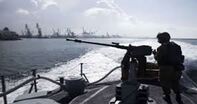
The Israeli occupation army on Thursday morning opened machinegun fire at Palestinian fishermen and their boats off the northern coast of the Gaza Strip.
Local sources said that Israeli gunboats opened fire at fishing boats off the shores of al-Sudaniya and al-Waha areas in northern Gaza.
They added that the gunboats chased some fishing boats, amid intensive gunfire, forcing them to return ashore.
Israeli gunboats are around Gaza fishermen almost every day, harassing them, shooting at them, damaging their boats, and making arrests. Sometimes fishermen are injured or killed during gunfire attacks.
Under the 1993 Oslo accords, Palestinian fishermen are permitted to fish up to 20 nautical miles off the coast of Gaza, but since then Israel has kept reducing the fishing area gradually to a limit of three nautical miles as part of its blockade on Gaza.
Fishermen and human rights groups also say that since the 2008-09 war in Gaza, the Israeli army has been regularly enforcing a limit even closer to the shore.
Local sources said that Israeli gunboats opened fire at fishing boats off the shores of al-Sudaniya and al-Waha areas in northern Gaza.
They added that the gunboats chased some fishing boats, amid intensive gunfire, forcing them to return ashore.
Israeli gunboats are around Gaza fishermen almost every day, harassing them, shooting at them, damaging their boats, and making arrests. Sometimes fishermen are injured or killed during gunfire attacks.
Under the 1993 Oslo accords, Palestinian fishermen are permitted to fish up to 20 nautical miles off the coast of Gaza, but since then Israel has kept reducing the fishing area gradually to a limit of three nautical miles as part of its blockade on Gaza.
Fishermen and human rights groups also say that since the 2008-09 war in Gaza, the Israeli army has been regularly enforcing a limit even closer to the shore.
20 nov 2019

Saudi Arabia on Tuesday condemned Israel’s aerial attacks on the Gaza Strip last week.
This came during the weekly cabinet meeting that was chaired by Saudi King Salman bin Abdul-Aziz, according to the official Saudi news agency.
The cabinet denounced the Israeli attacks on Gaza, which resulted in the death and injury of dozens of civilians, describing such aggression as “a violation of international law, humanitarian principles and international conventions.”
The cabinet also urged the international community to provide protection for the Palestinian people and address Israel’s practices that violate the international law.
This came during the weekly cabinet meeting that was chaired by Saudi King Salman bin Abdul-Aziz, according to the official Saudi news agency.
The cabinet denounced the Israeli attacks on Gaza, which resulted in the death and injury of dozens of civilians, describing such aggression as “a violation of international law, humanitarian principles and international conventions.”
The cabinet also urged the international community to provide protection for the Palestinian people and address Israel’s practices that violate the international law.
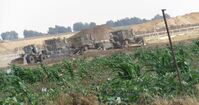
The Israeli occupation army on Wednesday morning carried out a limited incursion into the eastern area of Rafah province, southern Gaza Strip.
Local sources said that seven Israeli military bulldozers rolled a few hundred meters into Palestinian lands near the border fence and leveled them amid heavy firing of live ammunition.
The Israeli occupation army on a regular basis launches incursions into the eastern border areas of the Gaza Strip and razes agricultural lands there to prevent the Palestinians from cultivating them.
Local sources said that seven Israeli military bulldozers rolled a few hundred meters into Palestinian lands near the border fence and leveled them amid heavy firing of live ammunition.
The Israeli occupation army on a regular basis launches incursions into the eastern border areas of the Gaza Strip and razes agricultural lands there to prevent the Palestinians from cultivating them.
Page: 49 - 48 - 47 - 46 - 45 - 44 - 43 - 42 - 41 - 40 - 39 - 38 - 37 - 36 - 35 - 34 - 33 - 32 - 31 - 30 - 29 - 28
Truce violations List of names Pictures of martyrs
Days: Aug: 26 - 25 - 24 - 23 - 22 - 21 - 20 - 19 - 18 - 17 - 16 - 15 - 14 - 13 - 12 - 11 - 10 - 9 - 8 - 7 - 6 - 5 - 4 - 3 - 2 - 1
July: 31 - 30 - 29 - 28 - 27 - 26 - 25 - 24 - 23 - 22 - 21 - 20 - 19 - 18 - 17 - 16 - 15 - 14 - 13 - 12 - 11 - 10 - 9 - 8
